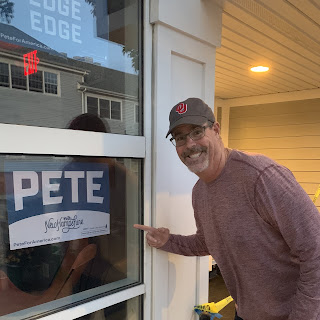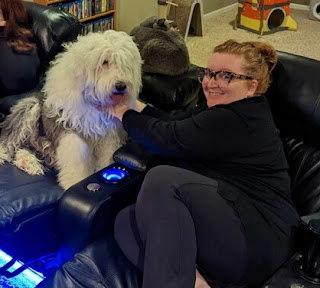Widowing - Year One
This is the face of a depressed, bipolar, suicidal, alcoholic who took his own life on March 22,
You’d never have guessed it. I didn’t know he was bipolar until after his death when I obtained his medical records. I had my suspicions there at the end. I chalked up his depression to my grandpa’s death. I fight depression daily, have for a long time, and it didn’t seem out of place in our home. Things got chaotic in the final weeks but, for the most part, our time together was pretty good.My husband was a giant goof. When he was happy you knew it. I have hundreds of photos of him just like this on my phone. He is only melancholy in one of them — taken just a few weeks before his death — as he stared out at a frozen lake. He was deep in a six week manic spiral. We’d left town because I needed a break from being inside the house with his energy, but I also didn’t want to leave him alone. I’d been trying for weeks to get him help. Unsurprisingly, a fifteen minute appointment with a psychiatrist, four weeks into the spiral, didn’t cut it. He took his life about two weeks after that appointment.
Suicide is hard to discuss. I tried a few online support groups to see if I could find some solace in the company of other widows. I’d found one of my best friends in the Alanon rooms and I wanted that same shorthand with someone that was navigating the hell of an addicted partner. Finding that group was harder than I expected.
If my husband had cancer, or been in an accident, or suffered a heart attack I could tell his story without looks of pity, disdain, and shock. Most of the people in the room were telling stories of holding their partner’s hand as he slipped away peacefully or how much love there was left when they were there one minute and gone the next. These people’s dead spouses would have given anything to still be on this planet.
Mine chose to leave. When I share that, people look at their shoes.
The platitudes that are often used after death don’t work in suicide — “God has a plan.” “Everything happens for a reason.” “He’s in a better place.” — they don’t fit. (Aside: I’m not sure they fit for any grieving family members…but definitely not suicide.)
The most helpful words that were spoken were: “I’m so sorry.” “I’m bringing you coffee/gift cards/food (but only when asked about food allergies/aversions).” “How are you doing, really, at this moment.” “I’m running to the store. What can I get you?” “This card contains money that I want you to spend on your own mental health.” “I’m bringing you paper plates.”
A couple of months ago I found a support group that is only for widows. All women. All with partners that killed themselves.
I was ‘lucky’ enough to to find a friend in that room whose husband’s death mirrored Pete’s death in so many ways. We’re new in the friendship but there are already so many things that I appreciate. There is that shorthand I wanted in our conversation/texts. There’s no cringing when the details of the how/where come up. It seems we can talk openly about the complicated details. We compare the dumb things we’ve heard when people don’t know what to say but say something (usually the wrong thing) anyway. We talk about the massive amount of physical and emotional energy that goes into #deathproductivity. You’d be shocked by the things we can say to each other. There’s no comparison on whose situation is worse. (Hint: the whole thing really sucks.)
I’m marginally better today at expressing my emotions than I was one year ago today. When the cops showed up at my house to tell me that they found my husband’s body in Colorado the primary emotion I felt was rage. I vacillated between rage and numbness for some time. There wasn’t a handbook for how to deal with the suicide of a spouse.
Today I can say that I’m sad (sometimes), I’m mad (less than I used to be), I miss him (frequently), I don’t (often), I wish there was something I could have done (occasionally), I was tired of doing work for him that he needed to do himself (absolutely), I’m doing okay (most of the time, all things considered), and I’m a complete grief concussed wreck (with no warning and at weird times).
I’m considering getting an ampersand (&) tattoo because I do think the word ‘and’ helps sum up what widowhood after suicide really feels like to me.
Suicide makes it hard to tell good stories about the dead. My anger has abated, I’m not going to use the word forgiveness, it’s just softened. I have so many memories from my almost decade with Pete. He was definitely not a perfect man but, as his daughter likes to say, “I picked him.”
He was inappropriate in social situations. He was abrasive. He couldn’t defeat his addiction. He could be quite self-centered. Turns out he was very ‘creative’ with many details of his past. He was a pretty immature parent who didn’t express himself well with his family. He could hold a grudge longer than anyone I’ve met. He would go silent for long periods when he was angry.
He was also the most supportive domestic partner — with no gender hangups — that I could have asked for. He was affectionate and I know that he loved me. He loved his kids (even if he was absolutely stunted in how to show that love). He loved my kids (in his own way, mostly through acts of service, and also was a pain in the ass.) He would sing House of Pain’s “Jump Around”, Digital Underground’s “Humpty Dance”, and then, without pause, start embarrassing me with Natalie Merchant’s “My Beloved Wife”. He’d dance down the stairs when Thomas Jefferson was singing in Hamilton. He was the best road trip partner. He was the muscle and always up to move people (we called ourselves Bitch and the Big Man). He loved to make me laugh. I’m trying to focus on those good memories while also not shaming myself when I’m also remembering the bad.
He was my ampersand. The good and the bad, it’s all part of it.
Today’s going to be what it is. I don’t fully know what to expect. I plan to be gentle with myself. If I need to break things, set things on fire, and scream, I’ll do it. If I need to sit in quiet reflection, I will. If I don’t think about him or I can think of nothing else —and that horrible day when I was told he took his own life by two cops sitting in my living room — that’s okay.
It’s been the longest, hardest, year of my life. It’s aged me. It’s tested me. It’s taught me that I can survive just about anything. It’s showed me who my support system really is (and I’m so grateful for them.)
***If you, or anyone you know, is experiencing thoughts of suicide, please reach out to trained professionals. 999 is a start. Immediate intervention is better.
And, for those whose loved ones did not get or accept help and ended their own lives — please know it is not your fault. You did what you could. Focus on getting your own help because the world still needs you.***




Comments